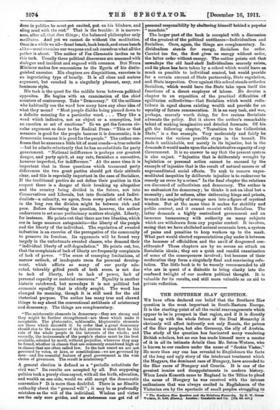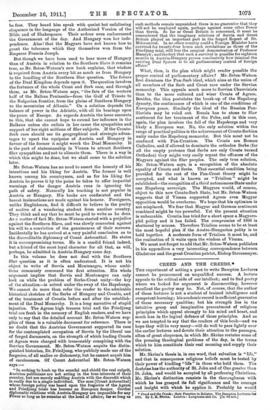THE SOUTHERN SLAV QUESTION.
WE have often declared our belief that the Southern Slav question is the most important in South-Eastern Europe. It is the starting-point of all the racial rearrangements which appear to be in prospect in that region, and if it is directly bound up with the whole future of the Dual Monarchy it obviously will affect indirectly not only Russia, the patron of the Slav' peoples, hut also Germany, the ally of Austria. The study of the question has fascinated many wandering British scholars, but no one has made himself more a master of it in all its intimate details than Mr. Seton-Watson, who is known to our readers under the name of "Scotus Viator." He more than any one has revealed to Englishmen the facts of the long and ugly story of the intolerant treatment which the Magyars, the dominant race of Hungary, have accorded to the Slav races of Hungary and Croatia. It is one of the greatest ironies and disappointments in modern history. When Louis ICossuth came to England in the 'fifties to plead the cause of Hungary he was received with the intense enthusiasm that was always excited in Englishmen of the Victorian era by the spectacle of small peoples struggling to
• The Etonthern Sian Question and Hue Habsburg Mouarebv. By IL W. Setae Watson, Lc Litt. (Oxon.). London: Constable and Co. [its. Sd. net.1
be free. They heard him speak with quaint but unfaltering eloquence in the language of the Authorized Version of the Bible and of Shakespeare. Their ardour even embarrassed the Government of the day. And Hungary won her inde- pendence. Alas ! that the Magyars have not known how to grant the tolerance which they themselves won from the Emperor Francis Joseph.
But though we have been used to bear more of Hungary than of Austria in relation to the Southern Slays it remains true, as Mr. Seton-Watson's new book explains, that wisdom is required from Austria every bit as much as from Hungary in the handling of the Southern Slav question. The future of the Dual Kingdom depends upon it. The question involves the fortunes of the whole Croat and Serb race, and through them, as Mr. Seton-Watson says, "the fate of the western half of the Balkan Peninsula—from the Gulf of Trieste to the Bulgarian frontier, from the plains of Southern Hungary to the mountains of Albania." On a solution depends the balance of power in the Adriatic, with all its bearings upon the peace of Europe. As regards Austria the issue amounts to this, that she cannot hope to extend her influence in the Balkans unless she enlists in her cause the sympathies and support of her eight millions of Slav subjects. If the Croato- Serb race should use its geographical and strategic advan- tages to upset the equipoise of Austria and Hungary in favour of the former it might wreck the Dual Monarchy. It is the part of statesmanship in Vienna to attract Southern Slav sympathies and not to alienate them. There is a way in which this might be done, but we shall come to the solution later.
Mr. Seton-Watson has no need to assert the honesty of. his intentions and his liking for Austria. The former is well known among his countrymen, and as for his liking for Austria he proves it by the pains he takes to offer impartial warnings of the danger Austria runs in ignoring the path of safety. Naturally his teaching is not popular in Austria or Hungary. His books are confiscated and the basest insinuations are made against his honour. Foreigners, unlike Englishmen, find it difficult to believe in the purity of motive of a wandering student from another country.
They think and say that he must be paid to write as he does. As a matter of fact Mr. Seton-Watson started with a prejudice against the Southern Slays, and was slowly converted against his will to a conviction of the genuineness of their sorrows. Incidentally he has arrived at a very painful conclusion as to the discreditable diplomacy of Count Aehrenthal. He states it in uncompromising terms. He is a candid friend indeed, but a friend of the most loyal character for all that, as will, perhaps, be admitted in Austria-Hungary some day.
In this volume he does not deal with the Southern Slav question as it is often understood. It is not his object to write of Servia and Montenegro, whose ambi- tions commonly command the first attention. His whole argument implies that Servia and Montenegro can only look on while the problem of Serbo-Croat unity—the key of the situation—is solved under the sway of the Hapsburgs.
We cannot do more than refer the reader to the admirable historical sketches of the Serbs of Hungary and Croatia, and of the treatment of Croatia before and after the establish- ment of the Dual Monarchy. It is a long narrative of stupid injustice. The Agram high treason trial and the Friedjung trial are fresh in the memory of English readers, and we have only to say that the detailed account Mr. Seton-Watson sup- plies of them is a valuable document for reference. There is no doubt that the Austrian Government supported its case for the contemplated occupation of Servia by the liberal use of forged documents, on the strength of which leading Croats at Agram were charged with treasonably conspiring with the Servian Government. Mr. Seton-Watson acquits the distin- guished historian, Dr. Friedjung, who publicly made use of the forgeries, of all malice or dishonesty, but he cannot acquit him of carelessness. Of Count Aehrenthal Mr. Seton-Watson says :—
"In seeking to hush up the scandal and shield the real culprit, Austrian politicians are not acting in the true interests of their country, but are merely saddling Austria with the discredit which is really due to a single individual. The man [Count Aehrenthal] whose foreign policy was based upon the forgeries of the Agram and Friedjung trials has become an European danger. Cordial diplomatic relations with Austria-Hungary are impossible for any Power so long as he remains at the head of affairs; for so long as such methods remain unpunished there is no guarantee that they will not be employed again, perhaps against some other Power than Servia. So far as Great Britain is concerned, it must be remembered that the imaginary relations of Servia and Great Britain played an important part in the forged Report of Dr. Milovanovia. In no other country could a Foreign Minister have survived for twenty-four hours such revelations as those of the Friedjung trial, still less the surgical demonstration of Professor Dra-qaryk ; and the fact that such a survival is possible for eighteen months in Austria-Hungary proves conclusively how inimical the existing Dual System is to all parliamentary control of foreign affairs.'
What, then, is the plan which might render possible the proper control of parliamentary affairs P Mr. Seton-Watson first dismisses the Pan-Serb ideal, which aims at the union of
all members of the Serb and Croat race under the Servian monarchy. This appeals much more to Servian Chauvinists than to the more cultured and wiser Croats of Agram. Besides, the idea postulates the break-up of the Hapsburg dynasty, the continuance of which is one of the conditions of
European peace. Similarly the ideal of the Russian Pan- Slavists may be ruled out. Russia has to atone to Slav sentiment for her treatment of the Poles, and in this case, again, the plan involves the fall of the Hapsburgs and very likely a European war. No, the only solution within the range of practical politics is the achievement of Croato-Serbian unity under the Hapsburg monarchy. But this must not be confused with Pan-Croatism. The Croats are Roman Catholics, and if allowed to dominate the orthodox Serbs (for all the empty pretence that Serbs are only Croats turned Orthodox) they might very easily repeat the offences of the Magyars against the Slav peoples. The only true solution, Mr. Seton-Watson says, is a recognition of the absolute equality of Croats and Serbs. That essential condition being provided for the rest of the Pan-Croat theory might be accepted, and what is known as " Trialism " might be established—the recognition of a third autonomous State under one Hapsburg sovereign. The Magyars would, of course, object to this new Croato-Serb State, but Mr. Seton-Watson suggests that if Vienna supported Agram even Magyar opposition would be overborne. We hope that his optimism is not misplaced. We fear that Magyar and German sentiment combined might be too powerful. Yet the present situation
is unbearable. Croatia has tried for a short space a Magyaro- phil policy and it has failed. The compromise of 1866 is shattered by misuse. Therefore Trialism seems to be at least the most hopeful plan if the Austro-Hungarian polity is to hold together. A moderate form of Trialism it must be, and
the realization of it waits upon the wisdom of Vienna..
We must not forget to add that Mr. Seton-Watson publishes in his appendices a very interesting correspondence between Gladstone and the great Croatian patriot, Bishop Strossmayer.



















































 Previous page
Previous page